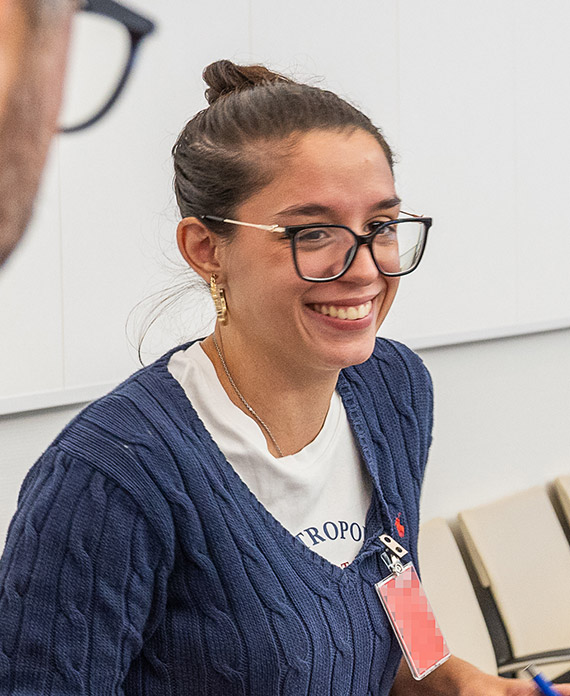About ICSSS
The International Cyber Security Summer School (ICSSS) is an annual summer school, originally organised by NATO C&I Agency, Europol, Leiden University and Security Delta (HSD). The first edition took place in 2015, starting with 40 students. Given the success, further editions of the Summer School have been hosted, allowing up to 60 students to participate in the program.


The digital threat is undiminished and constantly changing. Interwoven processes in the digital ecosystem mean that everyone can experience the consequences of a cyber incident, even if they seem remote at first. The consequences of attacks, incidents and security breaches are increasing. There is a growing need for cyber security to be treated as a strategic priority on an individual, organisational and governmental level.
Magazine 10th anniversary
This year marks the 10th anniversary of the International Cyber Security Summer School. For a decade, students, young professionals, and partners from all over the world have come to together in The Hague to learn, collaborate, and shape the future of cybersecurity.
This special lustrum ICSSS Magazine looks back on those ten years through photos, stories, quotes and interesting insights highlighting the most memorable moments and achievements along the way and a glimpse in the future.
Application criteria
To be eligible for this program, you should fulfill the following criteria:
- You have the nationality of (a) an EU Member state, (b) a NATO member state, and/or (c) a member state of NATO’s Partnership for Peace programme.
- You are (a) a PhD student, (b) in the final year of your Master’s or (c) a young professional.
- You have a technical, policy and/or law related background
- You have an updated Curriculum Vitae
- You are motivated to take this course, which is expressed in a letter of motivation
Tuition Fee
€ 475,-
The tuition fee includes:
- All reading material
- Certificate of attendance
- Social events e.g., BBQ’s, lunches and networking drinks.
Topics & Themes
The International Cyber Security Summer School (ICSSS) offers a multidisciplinary and forward-looking exploration of cyber security. In its 2025 edition, ICSSS addresses emerging and critical themes that define today’s cyber landscape, both in the Netherlands and abroad. With a balanced focus on policy, technology, law, and business, the programme ensures participants gain a holistic understanding of the complex cyber domain.
Students will start by examining the current cyber landscape, studying national and international developments in cyber strategy, regulation, and threat actors. By comparing different approaches across borders, participants gain insights into the global nature of cyber security challenges and cooperation efforts.
The school also delves into the convergence of Operational Technology (OT) and Information Technology (IT). This module explores how industrial systems and traditional IT environments intersect, creating both new efficiencies and novel vulnerabilities—especially in critical infrastructure sectors such as energy, manufacturing, and transportation.
Another focal area is the cyber security of supply chains. Students will assess how digital interdependencies can become points of weakness, and explore real-world cases where cyber incidents have disrupted business continuity. The module encourages critical thinking about resilience, vendor risk, and regulatory compliance.
The rise of Generative AI brings both innovation and new threat vectors. ICSSS participants will investigate how generative technologies are used in cyber defence and offence—from deepfakes and automated phishing to AI-powered threat detection. Ethical considerations and governance of these tools will also be discussed.
Cybercrime remains a persistent and evolving challenge. Students will study the behaviour, tactics, and infrastructure of cybercriminals, and understand the international legal and operational efforts to counter them. The module connects criminological insights with technical and legal perspectives.
Building on this, Digital Forensics introduces students to the tools and techniques used to investigate cyber incidents. From analyzing logs and malware to reconstructing attack timelines, this hands-on module provides practical skills and awareness of the evidentiary challenges in cyber investigations.
Lastly, ICSSS looks toward the future with Quantum Cryptography, where students explore how quantum technologies will transform encryption and data security. The implications of quantum computing for existing cryptographic systems are analyzed, along with the development of quantum-resistant protocols.
ICSSS continues to apply an integrative approach to cyber security education, linking theory and practice across disciplines. Participants are equipped with the insights, tools, and critical thinking needed to navigate and shape the future of global cyber security.
Besides acquiring high level theoretical knowledge on a broad spectrum of cyber security topics, students will also apply that knowledge to concrete cyber security related challenges, provided to them by leading (inter)national organizations or public institutions. The challenges aim at offering solutions to real-life cyber security problems that governments, private organizations, and the general public encounter.
ICSSS brings together students from all over the world and perspectives from various backgrounds. Through interaction with lecturers, organizations, and their fellow participants, students will finalize the ICSSS with a comprehensive view on how governments, companies, and organizations around the world approach, explore, and tackle the concept of cyber security.
Want to know more about ICSSS from a student's perspective?
If you are interested in the Summer School and you would like to know more, feel free to contact one of our student ambassadors! They successfully completed the 2024 Summer School and are ready to answer any questions you may have. Send them an email or a message on Linkedin and they will be happy to tell you more about the ICSSS.





